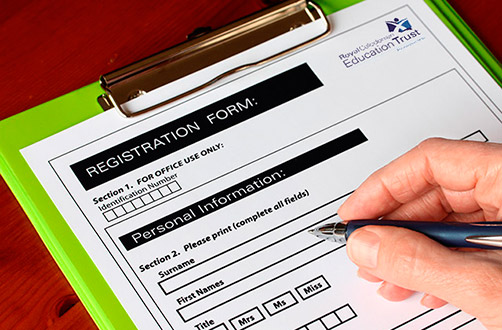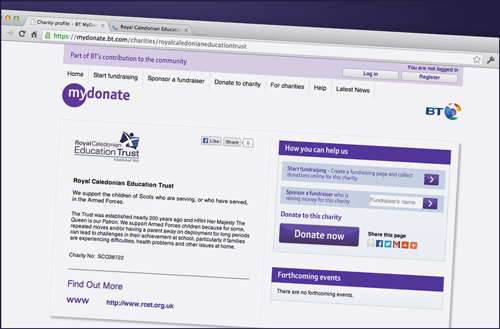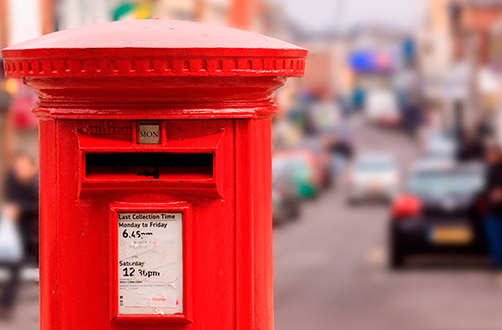Patron: Her Majesty The Queen
Fundraising
Last year we helped more than 300 children and young people from current and former Armed Forces families living in Scotland.
- Many of the Armed Forces families we support are on low incomes, struggling to make ends meet
- Many are living in some of the most deprived communities in Scotland
- Many families who ask for our support are living with post-traumatic stress disorder, disability or other health issues, leaving family members unable to work following active service
You can help provide a lifeline of support to these families who everyday give up so much for all of us. Every £1 donated can help make a valuable difference.
Use the buttons below to find out more!
Publicising your fundraising

Having decided what you are going to do, you will want everyone to know about it. We suggest you use every form of communication and promotion available to let people know about your fundraising activity and that you need their help to raise as much money as possible. For example, putting posters and flyers in local community centres, businesses, schools and at workplaces – anywhere where people will see them.
Ask everyone you know to come along and spread the word to family, friends and colleagues.
Engage the local media to publicise your fundraising activity. Write a press release and send it to local newspapers and radio stations.
In your press release, make sure to include:
- Details about your event (i.e. time, date, place, fundraising target)
- Why you’re raising money in aid of the Royal Caledonian Education Trust (mention if you have a personal link to the charity)
- Information about who we are and what we do
- How people can access our services
- Your contact details and how people can support you (include details of your online fundraising page if you have one)
- We have included here a template press release for your use. (See below)
Online promotion
Make modern technology do all the hard work. Here’s how you can use your email and social networking accounts to spread the word:
- Email all your contacts and let them know what you’re doing
- Add a caption to your email signature, inviting anyone to attend, donate or help out on the day
- Send a Facebook message to your friends and family
- On Twitter? Post a tweet about your event and ask your followers to retweet it
- Upload a video clip to YouTube and send it to everyone you know with your invite and ask them to pass it on
Return to top
Fundraising toolkit

We have lots of great information, advice and support materials to help you raise money and have a terrific time doing it. Whether it’s a high quality ‘In aid of…’ logo you are looking for, a sponsor form, poster or other support materials, you can find it all here.
We can offer you disposable banners and balloons (stocks depending) to help you promote your fundraising activity. To order these please contact us.
If you are going to make your own posters and fundraising materials please be sure to include the charity’s logo and registration number on all your flyers, posters, invitations and press releases so that potential supporters know your event is in aid of the Royal Caledonian Education Trust.
Return to top
Register your fundraising event

If you have already decided to organise a fundraising event, please register your details with us by completing an event registration form. We will also make sure you receive a letter of thanks acknowledging receipt of the monies you raise and send in to us.
Before you start fundraising, please don’t forget to familiarise yourself with the dos and don’ts of fundraising. There are lots of good websites that can help you, such as the Institute of Fundraising or the Charity Commission
In addition, we’ve included our own guide on how to make your fundraising safe and legal below.
Finally, thank you for choosing to raise money in aid of the Royal Caledonian Education Trust. You are helping to provide a lifeline of support for Armed Forces children and every pound raised will make a significant difference!
Return to top
Fundraising online

You can start raising money today simply by registering your event on our BT My Donate page.
Creating an online fundraising page is a quick and easy way to collect money and manage your fundraising.
It only takes a few minutes to set up and your friends and family can make secure donations and leave their messages of support anywhere, anytime.
Your online fundraising pages also gives your supporters the opportunity to Gift Aid their donations, which means the Royal Caledonian Education Trust receives 25% more – at no cost to you or your sponsor.
Start raising money now by creating your online fundraising page. Raising money with an online fundraising page enables you to:
- Personalise your page with photos and video
- Send in your money directly to the Royal Caledonian Education Trust without having to use a banking form
- Add money you collect at your event
- Promote your fundraising page on your Facebook profile
- Collect Gift Aid on your supporters’ donation
- Personalising your page is the best way to get support – and donations – from friends and family. Talk about what you are doing to raise money and why you chose the Royal Caledonian Education Trust. Remember to include a photo on your page to give your page an eye-catching edge. It could be a picture of you preparing for your fundraising activity or event.
Return to top
Sending in your donations

When your event is finished, it is always best to collect the money you have raised as quickly as possible. Try to ensure that two people are present when you are counting cash.
Please don’t send cash in the post. Bank any cash or cheques made payable to you and then write a cheque payable to ‘The Royal Caledonian Education Trust’ for the amount collected and send it to:
The Royal Caledonian Education Trust, Queen Elizabeth House, 4 St Dunstan’s Hill, London EC3R 8AD
Include any sponsorship forms you have used so we are able to claim Gift Aid – this means your gift to us will be worth 25% more. Please enclose a note with your name, address, postcode and details of the event so we can thank you properly for your fantastic fundraising support.
Return to top
Make your fundraising safe and legal

Getting started
When you’re fundraising for the Royal Caledonian Education Trust, you are acting “in aid of” the Royal Caledonian Education Trust, rather than “on behalf of” or “representing” the Royal Caledonian Education Trust. This means that you are independent of the Royal Caledonian Education Trust and what you do does not fall under the Royal Caledonian Education Trust’s control.
Please make sure that your fundraising materials and posters include the line:
In aid of the Royal Caledonian Education Trust: Charity Commission No.: 310952 (England & Wales) Scottish Registered Charity No.: SCO38722 (Scotland).
Please complete our event registration form to inform us of your fundraising plans.
Charity Law
Charity Law requirements mean that the Royal Caledonian Education Trust cannot take responsibility for what you do as a volunteer when you are fundraising “in aid of” the Royal Caledonian Education Trust (Charities Act 2006).
Insurance
The Royal Caledonian Education Trust insurance does not cover events organised by supporters. You must make sure that you have an appropriate level of insurance in place for the activity or event you are carrying out.
Check whether the venue or organiser has their own insurance which will cover what you are planning. You may be able to pay a small supplement for your event to be included in their policy. As a minimum, you need to ensure that you have public liability insurance for any event in which members of the public will participate.
Risk assessments
You must ensure that you carry out appropriate risk assessments for your fundraising activity. A risk assessment is intended to help you identify the risks involved in your event or activity, assess the likelihood of the risk arising, find ways in which you might eliminate or reduce the risk.
There is a useful summary of how you might approach a risk assessment on the Health and Safety Executive website
Licences and permissions
There are a number of activities for which you will need a licence. You should check carefully on the relevant websites when you are planning an event to make sure you have covered the licensing requirements. Licences or permissions will be required, for example, for:
- Lotteries and raffles (see below)
- Collecting funds on the street (the Royal Caledonian Education Trust does not carry out door-to-door collections and asks that you do not do so on its behalf)
- Selling alcohol
- Public entertainment.
For all of the above you will need to contact your local authority.
- Playing copyrighted music – see PRS
- Adventurous activities involving under-18s – you’ll need to go through a recognised and licensed organisation to carry out this type of activity. You should also check that the organisation carries out Disclosure checks on all its employees.
Obviously the venue provider or organisation you are working with to carry out the event or activity may already have the relevant licence – if so, ask to see it or get confirmation in writing.
Lotteries and raffles
If you’re planning any type of lottery (such as a raffle, tombola or sweepstake), please be aware that there are strict rules about what you can do. Lotteries are regulated by the Gaming Commission for Great Britain. Find out more. The Gambling Commission states that Lotteries fall into a number of different categories:
- Customer lotteries
- Non-commercial lotteries (that are incidental to another event)
- Private society, work and residents’ lotteries
- Small and large society lotteries
- Local authority lotteries.
- The Gambling Commission has produced a very useful guide on running a lottery.
Only customer, non-commercial and private society/work/residents’ lotteries can be run without the requirement for either a licence from the Gambling Commission or registration with a licensing authority.
The most common form of lottery that can be used to benefit the Royal Caledonian Education Trust is the non-commercial lottery. To ensure that your lottery stays within the legal definition of a non-commercial lottery, you will need to comply with the following requirements:
- The lottery must be incidental to a non-commercial event (e.g. a fete or social event at which all of the proceeds go entirely to purposes that are not for private gain)
- No more than £100 can be deducted from the proceeds in respect of expenses incurred in organising the lottery
- All tickets must be sold on location at the event and a winner announced at the event
- There can be no rollover of prizes from one lottery to another
- Cloakroom tickets can be used as the ‘token’ for taking part
- No more than £500 can be spent on prizes for the lottery
- All proceeds (except up to £100 in expenses) must come to the Royal Caledonian Education Trust.
If you do not believe that your lottery is going to meet the above criteria then we would urge you to think very carefully about using a lottery to raise funds for the Royal Caledonian Education Trust and check the legal requirements for running an alternative type of lottery.
Children
If children (under 16) are involved in fundraising in any way, please make sure that they have permission from their parent or guardian and are properly supervised by a responsible adult.
You should be aware of your responsibilities if children are going to be present at or taking part in an event. For example, any adult tasked with supervision of children who may be left alone with them may need to be checked via Disclosure Scotland.
First Aid
Consider first aid provision. Some events will require it. Ensure you have adequate cover available for the scale of your event. If you’re not sure, check with your local authority.
Food
You don’t need a licence to sell food, but you should ensure that food is prepared in a hygienic manner and complies with the Food Safety Act.
Check out references and/or qualifications of suppliers – e.g. if caterers or food suppliers have the relevant Food Hygiene and Environmental Health certificates. If you are preparing food yourself, you’ll be well advised to get someone involved who has studied the Basic Food Hygiene Certificate course.
Contact your local authority for food hygiene regulations at events or visit www.foodstandards.gov.scot
Alcohol
If you are using a venue and alcohol will be available, check if the venue is licensed or contact your local council to find out more about getting a temporary licence.
Return to top







